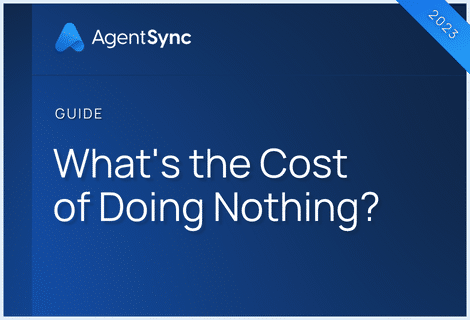

A note from AgentSync: The Commissioners’ Corner is an ongoing series where the AgentSync blog team invites state insurance commissioners to share their unique perspectives on industry regulation. While we often speak about a nationwide insurance perspective, each state has a culture of regulation specific to their state’s politics, attitudes, and demographics.
This blog aims to provide insight into state-level insurance concerns; it isn’t legal advice, a crystal ball on regulation, or an editorial endorsement by the AgentSync team.
This Commissioners’ Corner is brought to you by Washington’s Commissioner of Insurance, Mike Kreidler.
Record Applications from Producers, Instituting a Ban on Credit Scores and Cracking Down on Fake Health Care Sharing Ministries
Credit scoring
We are finishing rulemaking on a three-year ban against insurers using credit scores as a factor in setting insurance premiums. The rule is scheduled to take effect on Jan. 1, 2022.
Perhaps not surprisingly, the insurance industry has vociferously objected to the ban. However, in the 20-plus years I’ve been fighting the use of credit scores in property insurance, insurance producers have routinely voiced their support for not penalizing people who have low credit scores, often through no fault of their own.
Several other states, including California, ban or limit the use of credit scores in setting premiums. Despite insurers’ prognostications about the harm it will cause to Washington’s market, the markets in those states are doing just fine.
Some companies are transitioning away from the use of credit scores and relying on something that makes sense – people’s driving habits, including mileage, location, and driving history. Legitimate privacy concerns exist about telematics and not everyone would be comfortable with this monitoring. Certainly, appropriate guardrails are needed, but many regulators including myself see the promise telematics offer for helping insurers fairly price risk posed by drivers and homeowners.
There are other innovative ideas that could benefit consumers, but that’s assuming the insurers really wants to help all policyholders. That’s especially true for seniors. Insurers routinely raise premiums based on age and even take advantage of their longtime loyalty by never offering them better rates.
We need to get to the root causes of insurance claims. Credit scores do not cause accidents. Credit scores are a tool of the financial industry – and now the insurance industry. They use these scores to sell more policies to the people they really want to insure.
Producer licensing is seeing record applications and transactions
In 2020 and 2021, we’ve seen a record number of transactions and phone calls with producers. There are many factors behind the increase in the number of people wanting to be insurance producers. A big one is the fact that many people changed careers due to the pandemic. Being an insurance producer has relatively low startup costs and it’s a job you can do without in-person contact. Other factors include Medicare Open Enrollment; we saw record-high numbers of applications in September and October 2020 and even higher numbers in September and October 2021. The inception of the Washington Cares Fund, the state-run, mandatory long-term care plan, brought a high number of applications from nonresident producers in the disability line of authority.
In all, we processed 42 percent more applicants in October 2021 than we did the same time the previous year. In the past 10 years, applicants have increased by 135 percent. Applicants have increased 12 percent so far in 2021 from what we processed in all of 2020. All of that work has been handled by five full-time employees. We will add two more staff, one permanent and one temporary, to help with the workload by the end of the year.
Health care sharing ministries
In the past few years, we’ve taken action against several unauthorized insurers trying to do business as health care sharing ministries. These businesses do not meet the legal criteria for being a legitimate health care sharing ministry, which requires that they were formed before Dec. 31, 1999, and their members must have been actively sharing medical costs.
We are working on rulemaking that will provide additional clarity about entities that want to operate in Washington state.
Here are highlights from a few enforcement actions we’ve taken:
Our most recent enforcement action, against Makina Health, came about because insurance producers who were selling the products were concerned about the plans’ legitimacy and reached out to our office to make sure the products were legal. We fined Makina $100,000 for illegally selling employer health insurance plans to small businesses in Washington state. We found that neither the employers nor the producers who sold the products could identify who was responsible for paying claims. From Makina’s inception in October 2018 through February 2020, it sold plans to 28 Washington employers covering a total of 572 employees and collected $1.1 million in premiums.
Trinity Healthshare, Inc., underwrote 3,058 policies sold to Washington consumers and collected $3.8 million in premium. We fined Trinity $150,000 and ordered it to permanently stop insuring people in Washington state. Its producer, Aliera Healthcare, Inc., paid a $1 million fine and was ordered to stop selling health insurance as well.
Alliance for Shared Health, Inc., and Shared Health Alliance, its insurance producer, paid fines of $80,000 and $7,500, respectively, and agreed to stop doing insurance business in Washington state. We received eight complaints from consumers about their policies, primarily involving Alliance for Shared Health’s refusal to pay claims. Some of the consumers faced tens of thousands of dollars in medical bills.
OneShare Health LLC paid a fine of $150,000 and will refrain from selling insurance in Washington state. OneShare also dismissed a federal lawsuit against our office. It enrolled over 7,000 members in Washington who paid $12 million in monthly premiums that OneShare called “contributions.” Six members complained to our office about unpaid claims. OneShare Health LLC previously did business in Washington state using the names Kingdom HealthShare Ministries, LLC and Unity Healthshare, LLC.

